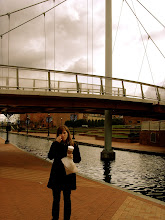Interesting how Ayn Rand seems to save the majority of her philosophy for the very end of the novel. She clearly draws readers into the novel through an easy-to-understand plot, through which we catch glimpses, and understand at basic levels, her philosophy. Yet, it is not until the last 150 pages (or so) that a reader truly comes face to face with what Rand wants her audience to understand. I think it is safe to say that this is intentional, as one can only truly grasp her philosphy once the plot and its characters are fully developed.
While I do not agree with the majority of Rand's philosophy, I believe there is still something to take from this novel.
-I can now say that I truly understand why Communism and Facism are considered true evils. In understanding this, I come to respect Capitalism more.
-And second, I believe that Rand's support for egotism versus altruism can suggest the common struggle that a person of faith has within their worldly existence (even though this is not, I know, her intention).
- the knowledge that one is to be selfless, but also the need to be selfish in some contexts in order to survive in this world.
Thus closes the semester I have spent with this novel.
Next venture- Thoreau.



1 comment:
I'm glad this is finished. I'm glad Anna is no longer trapped between the pages of that book. But I'm like hearing someone read a book and then pick apart the philosophy in it. It's the inner philosopher in me.
Post a Comment